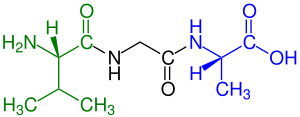
green marked amino end (L-Valine) and
blue marked carboxyl end (L-Alanine)

green marked amino end (L-valine) and
blue marked carboxyl end (L-alanine)
An oligopeptide (oligo-, "a few"), is a peptide consisting of two to twenty amino acids, including dipeptides, tripeptides, tetrapeptides, and other polypeptides. Some of the major classes of naturally occurring oligopeptides include aeruginosins, cyanopeptolins, microcystins, microviridins, microginins, anabaenopeptins, and cyclamides. Microcystins are best studied because of their potential toxicity impact in drinking water.[1] A review of some oligopeptides found that the largest class are the cyanopeptolins (40.1%), followed by microcystins (13.4%).[2]
- ^ Martin Welker; Hans Von Döhren (2006). "Cyanobacterial peptides – Nature's own combinatorial biosynthesis". FEMS Microbiology Reviews. 30 (4): 530–563. doi:10.1111/j.1574-6976.2006.00022.x. PMID 16774586.
- ^ George E. Chlipala; Shunyan Mo; Jimmy Orjala (2011). "Chemodiversity in Freshwater and Terrestrial Cyanobacteria – a Source for Drug Discovery". Curr Drug Targets. 12 (11): 1654–73. doi:10.2174/138945011798109455. PMC 3244969. PMID 21561419.